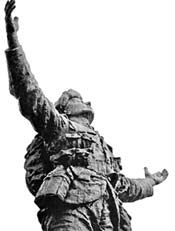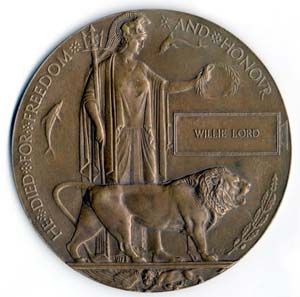“Their name liveth for evermore?”
Saturday, 17 November 2012
 Remembrance Sunday calls together members of local communities to stand in front of the war memorial and honour those who served and died in wars. These memorials have been a familiar part of our townscapes since the end of World War One, but as Mike Edwards told a meeting of the Hebden Bridge Local History society (14 Nov), memorials can be found in many forms and in unusual places.
Remembrance Sunday calls together members of local communities to stand in front of the war memorial and honour those who served and died in wars. These memorials have been a familiar part of our townscapes since the end of World War One, but as Mike Edwards told a meeting of the Hebden Bridge Local History society (14 Nov), memorials can be found in many forms and in unusual places.
Mike’s work in recording local memorials for the archive of the Imperial War Museum has found memorials in chapels and cricket clubs, drinking fountains, book dedications, stained glass windows and even pipe organs, as well as the more familiar statues of anonymous soldier heroes.
Rolls of honour in chapels and clubs claimed those whose bodies lay ‘somewhere in France’ for the local communities. Those who had served became heroes, celebrated for their loyalty to the community they came from. One of the most moving memorials is a plaque at Victoria Station in Manchester, recording those who passed through the gate on their way to the trenches of France. There is little evidence of triumphalism in the memorials, an inscription on a grave at Slack records a son who ‘passed from this awful war into perfect peace’ and there is the bleakness of a young man ‘not seen or heard of since.’

The Dead Man’s Penny (or Widow’s Penny) was issued to the next of kin of servicemen/ women who had fallen in the Great War between 1914 and 1918
Many communities incorporated a memorial in a project to benefit the living, such as playing fields and parks, new Sunday School buildings and church organs. Hebden Bridge itself had an elaborate scheme which would have provided a cottage hospital and ambulance alongside a memorial cross. However there was considerable controversy, and the costs proved prohibitive. In the end, Hebden Bridge’s memorial garden was not finished until 1938. Those who attended the opening could not have known how soon they would be fighting another war.
The work done by Mike Edwards and other volunteers is an attempt to ensure that the memorials of war and their dreams of a more peaceful world are not forgotten and his talk provided much to reflect on.
Future meetings of the Hebden Bridge Local History Society, held every other Wednesday evening at Hebden Bridge Methodist Hall, will hear a ‘lament for the mills’ by Robert Cockcroft and the history of Dawson City and the Walshaw Dean Reservoir by Ann Kilbey and Corinne McDonald. Details on the HebWeb's What's on section, Hebden Bridge History website and in local libraries.
See also
Clubhouses: self help and co-operation - A small row of houses in Old Town, called Clubhouses, encapsulates some of the history and spirit of the Calder Valley explains Julie Cockburn. (30 October 2012)
Small Town Saturday Night - The story of a love affair with rock 'n roll at its peak in the 1950s and 60s from speaker Trevor Simpson.
The world of Cornelius Ashworth, speaker Alan Petford, Local History talk of 10 October 2012


